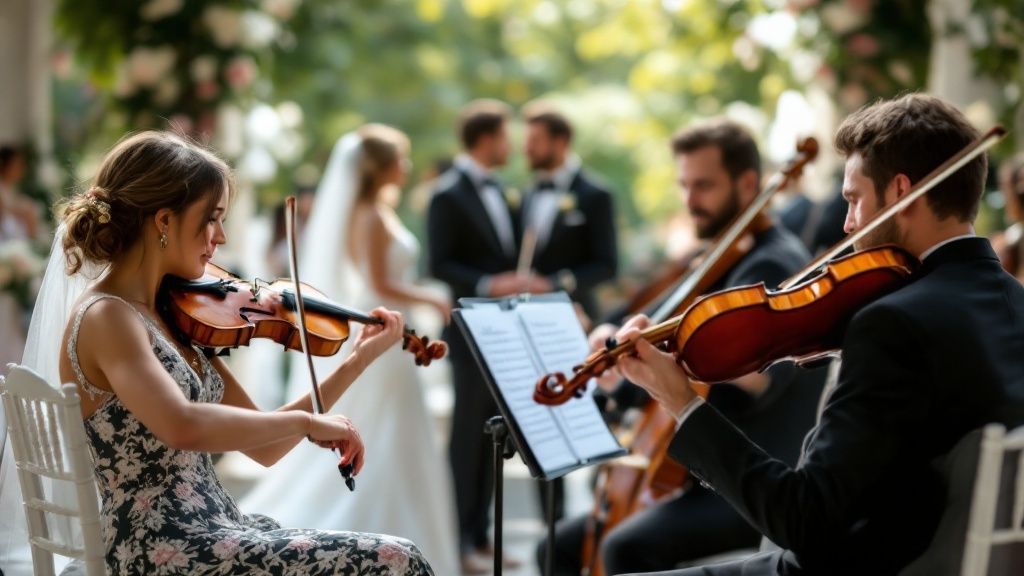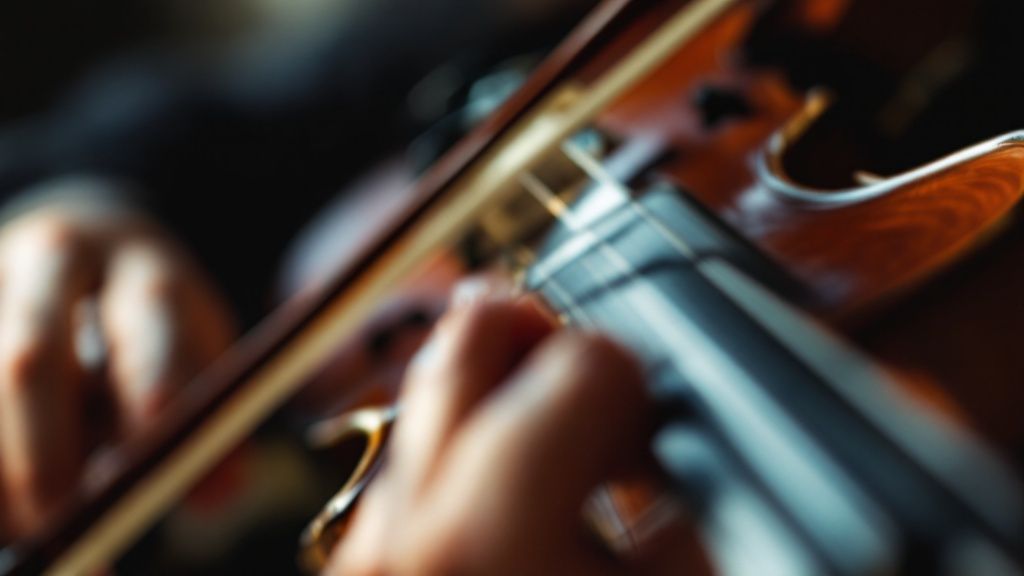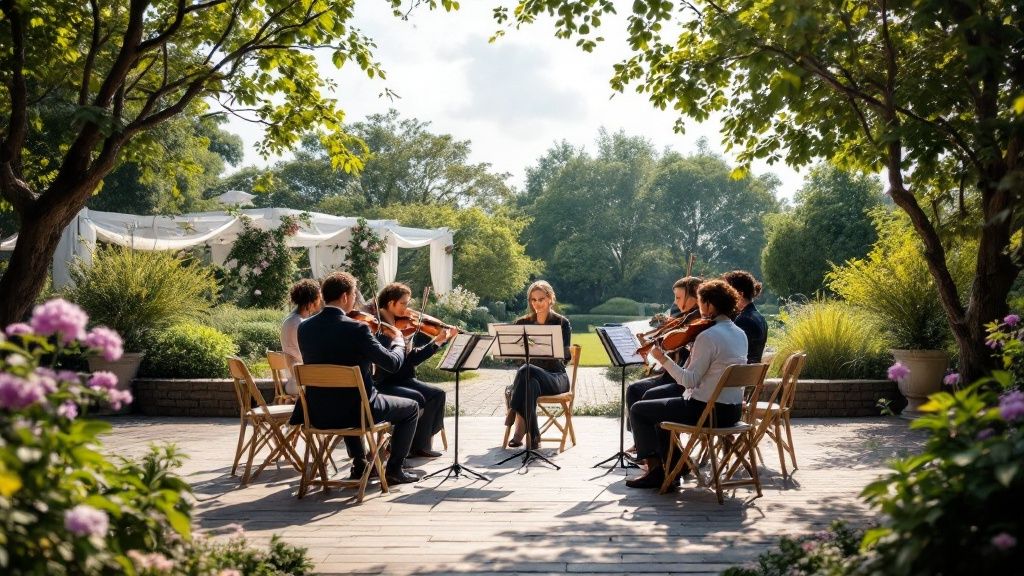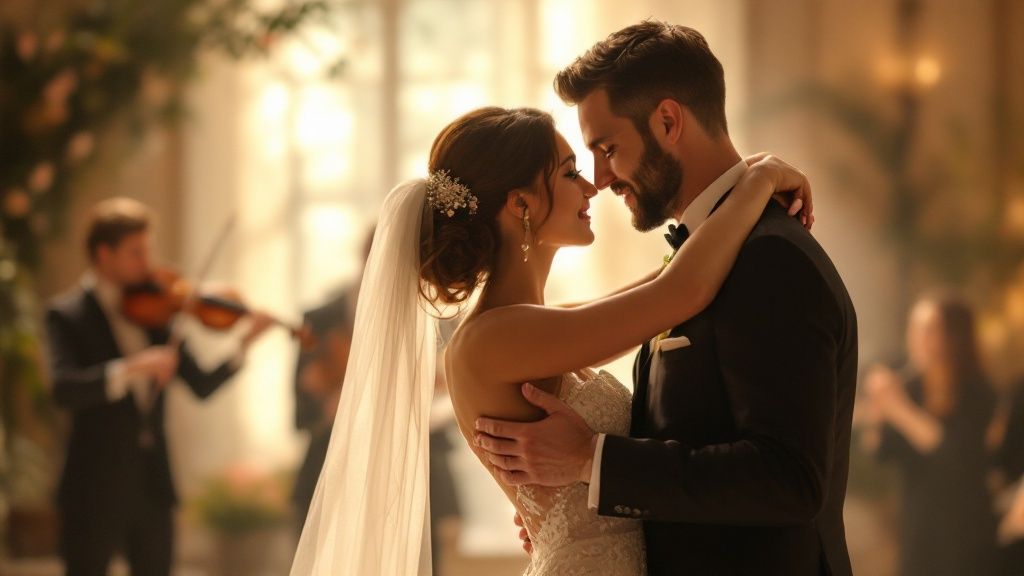The Timeless Impact of String Quartet Wedding Music
A string quartet brings an extra layer of magic to wedding ceremonies through the perfectly balanced blend of two violins, viola, and cello. These four instruments work together to create rich, intimate music that speaks to both classic and contemporary tastes. Unlike photos or videos that capture visual memories, string quartet music creates an emotional experience that guests feel in their hearts. It's an ideal choice for couples who want their ceremony to have an elegant, refined atmosphere.
Setting the Atmosphere with Pre-Ceremony Music
The moments before a ceremony are vital for creating the right mood. As guests begin arriving and finding their seats, thoughtfully selected quartet music helps build anticipation while keeping everyone relaxed. Picture the soothing notes of Debussy's "Clair de Lune" floating through the air as family and friends gather. This immediately signals to guests that they're about to witness something special.
Enhancing Key Moments: From Processional to Recessional
A string quartet adds depth to the ceremony's most important moments. For the processional, when the wedding party makes their entrance, the quartet can perform traditional pieces like Pachelbel's "Canon in D" or modern favorites arranged for strings. The musicians can also provide beautiful accompaniment during:
- Exchange of vows
- Unity candle lighting
- Signing of the register
- Other symbolic moments
Their live performance makes these moments even more meaningful and memorable.
String quartets have deep roots in classical music history, particularly during the Classical and Romantic eras. The format gave composers an ideal way to express musical ideas, resulting in a vast repertoire that works beautifully for weddings. The balanced sound of four string instruments creates perfect ceremony music. Learn more about string quartet history and traditions.
Creating Lasting Memories Through Music
A string quartet does more than provide background music – it tells the story of your ceremony through sound. From the gentle melodies that welcome guests to the joyful music that celebrates the newlyweds' exit, the quartet weaves all the moments together into one cohesive experience. The music becomes part of guests' memories of the day, adding rich emotional depth that lasts long after the celebration ends.
Masterful Classical Selections That Move Hearts

Classical music adds grace and beauty to wedding ceremonies in ways few other genres can match. The right pieces create moments of pure magic that guests remember for years to come. When thoughtfully selected, these timeless works help tell your unique love story.
Beyond "Canon in D": Exploring Classical Gems
While Pachelbel's Canon in D remains the most requested wedding piece, the classical repertoire offers so many other stunning options. Bach's "Air on the G String" brings a peaceful, reverent mood perfect for processionals or quiet ceremony moments. For a more festive feel, Handel's "Water Music" fills the space with joy and celebration.
The enduring popularity of Canon in D makes sense – its familiar melody and flowing harmonies instantly put guests at ease. In fact, research shows it's the #1 most performed piece at weddings across all genres. But this also presents a chance to discover equally beautiful but less common classical works that will make your ceremony stand out. Learn more about classic wedding music selections.
Building Emotional Crescendos Throughout Your Ceremony
Expert wedding musicians know how to arrange pieces to create natural emotional peaks and valleys. The music should mirror and enhance key moments, from the anticipation before the ceremony to the joy of the recessional. Light, delicate pieces work well for seating guests, while more powerful selections can underscore dramatic moments like the couple's first kiss.
Creating a Fresh and Personal Touch
Classical music brings elegance to any ceremony, but avoid letting your selections feel predictable. Consider these ways to make the music your own:
- Mix in string quartet versions of meaningful modern songs
- Choose lesser-known works by famous composers
- Combine pieces in creative, unexpected ways
- Feature different musical groupings throughout the ceremony
The key is selecting music that reflects your personality while honoring classical tradition. This thoughtful approach ensures the soundtrack to your special day feels both timeless and uniquely yours.
Contemporary Hits Transformed Through Classical Elegance

Many couples want to blend classical music's graceful sound with songs that reflect their personal taste. String quartets have mastered the art of adapting modern songs into elegant classical arrangements. This allows couples to include meaningful songs in their ceremony while maintaining the refined atmosphere that string instruments create. The result is a unique musical experience that resonates with both the couple and their guests.
Working With Arrangers to Create Unique Versions
A great string quartet arrangement takes more than just converting notes from one format to another. Expert arrangers must understand what makes the original song special and find ways to express that through four string instruments. They might add new harmonies, create interweaving melody lines, or adapt the rhythm to suit the quartet format. It's similar to how a skilled chef reimagines a classic dish – keeping what makes it special while presenting it in a fresh way.
Avoiding Common Arrangement Pitfalls
Quality varies significantly between different arrangements. Two main issues to watch for are arrangements that oversimplify the original song, losing its emotional impact, and ones that become too complicated and lose the song's essence. The key is finding middle ground. A stripped-down pop song might feel empty, while an overly complex version could feel out of place at a wedding.
String quartets show amazing range in the types of music they can play effectively. While they excel at pieces by classical composers like Bach, they also beautifully interpret songs by modern artists like John Legend, Christina Perri, and Ed Sheeran – making them ideal for weddings. Learn more about popular string quartet wedding songs.
Evaluating Sample Recordings and Ensuring Cohesion
When selecting arrangements, carefully review sample recordings from the quartet. Focus on their technical skill, how well they capture the original song's spirit, and the overall feel of their performance. Think about how modern selections will blend with traditional ceremony elements. A rock song might feel jarring next to a hymn, but a thoughtfully arranged pop song can flow naturally into classical pieces. Taking time to consider these elements helps create a ceremony that feels both personal and polished.
Crafting Your Ceremony's Musical Journey

Your wedding ceremony needs more than just random songs – it needs a thoughtful musical story. The right string quartet selections can weave together each moment, creating a rich emotional experience. When planning your ceremony music, consider how the pieces will flow together rather than just picking individual songs you like.
Timing Transitions and Managing Ceremony Length
The duration of your ceremony will shape your music choices. A brief 15-minute ceremony might only need three or four key pieces for the processional, recessional, and special moments. Longer ceremonies open up possibilities for musical interludes between sections and different themes that build anticipation throughout the event.
Creating Meaningful Musical Cues
Music serves as a natural way to signal key moments in your ceremony. Consider how different pieces can highlight:
- The wedding party's entrance
- Exchange of vows
- Ring ceremony
- Final pronouncement
Choose brighter, lively pieces for the wedding party procession and save more tender melodies for intimate moments like exchanging rings. These musical markers help your ceremony unfold with grace and emotional depth.
Adapting to Venue Acoustics and Ceremony Styles
Your venue greatly affects how string quartet music will sound. A soaring cathedral requires different musical choices than a garden ceremony. For outdoor settings, pick pieces with strong melodies that won't get lost in wind or background noise. Match the music to your ceremony style too – classical selections for traditional services or modern string arrangements of popular songs for contemporary celebrations. Taking time to consider these details ensures the music fits perfectly with your vision.
Maximizing Your Partnership With Professional Musicians
Working with a string quartet requires thoughtful planning and coordination. Good communication helps ensure your wedding ceremony music unfolds exactly as you envision. Going beyond basic logistics to actively collaborate with the musicians will help bring your musical vision to life.
Clear Communication: The Foundation of a Successful Performance
Start by sharing your specific musical preferences with the quartet. Discuss your desired song selections, arrangements, and the overall atmosphere you want to create. Whether you're drawn to classical pieces like "Canon in D" or string versions of popular songs, being specific helps. Share example recordings or playlists that capture your preferred style to give the musicians clear direction.
Handling Special Requests and Collaborative Problem-Solving
Most quartets can learn new pieces or create custom arrangements with enough notice. Keep in mind that special requests may require extra preparation time and affect pricing. Have an open discussion about what's possible while respecting the musicians' expertise. If a particular song proves too complex to arrange, the quartet may suggest similar alternatives that achieve your desired effect.
The Importance of a Detailed Music Plan
Map out each musical element of your ceremony, including:
- Prelude: Music that welcomes arriving guests
- Processional: Entrance music for the wedding party
- Ceremony: Music during key moments like vows
- Recessional: Exit music after the ceremony
- Postlude: Music as guests depart
Include specific timing requirements and transition cues to ensure smooth flow between segments.
Contract Essentials and Rehearsal Strategies
A clear contract protects everyone involved. Key elements should include:
- Performance date and duration
- Venue details and setup needs
- Payment terms and schedule
- Cancellation and refund policies
Even a brief rehearsal helps musicians get familiar with the space acoustics and confirm all cues and transitions. This is also a good time to make any final adjustments.
Addressing Common Challenges: Outdoor Acoustics and Timing Changes
Outdoor ceremonies require special consideration. Talk through potential issues like wind noise with the quartet – they may need amplification or suggest songs that project well outdoors. Have a plan for schedule changes too. Since weddings rarely run exactly on time, discuss how the quartet can adapt if things run long or short. They may have extra pieces ready or know how to adjust existing selections. Proper planning turns potential issues into seamless solutions.
Building Your Perfect Ceremony Soundtrack

Your wedding ceremony music sets the emotional tone and helps tell your unique love story. Like planning the perfect meal, it requires thoughtful selection and arrangement of pieces that complement each other. Let's explore how to create a string quartet playlist that makes your special day even more memorable.
Mixing Classic and Contemporary Choices
Most couples opt for a blend of traditional wedding music and modern adaptations. Time-tested pieces like Pachelbel's "Canon in D" bring elegance and gravitas to key moments. But don't hesitate to include fresh takes on newer songs – having your favorite pop tune arranged for strings can create wonderfully personal moments that guests won't expect.
Adding Personal Meaning
The best ceremony music reflects who you are as a couple. Think about songs that mark important points in your relationship or genres you both love. Maybe there's a special track that reminds you of your first date, or an artist whose music brought you closer together. These thoughtful touches make the ceremony distinctly yours.
Creating Smooth Musical Flow
Good ceremony music guides guests through emotional shifts naturally. Each section needs appropriate accompaniment – from gentle background pieces during guest arrival to more dramatic selections for key moments. For example, choose softer, romantic music for the processional and save the most joyful, energetic piece for your recessional celebration.
Practical Planning Tips
Keep these key factors in mind when selecting your music:
- Ceremony Duration: Short ceremonies need fewer pieces, longer ones allow more musical variety
- Room Sound: Consider how music will carry in your venue – large spaces need fuller pieces
- Overall Style: Match music to your ceremony tone, whether traditional, modern or mixed
This table shows some classic and contemporary song options:
| Ceremony Element | Traditional Selection | Modern Selection |
|---|---|---|
| Processional | Pachelbel's "Canon in D" | A string quartet version of "A Thousand Years" by Christina Perri |
| Recessional | Mendelssohn's "Wedding March" | An upbeat arrangement of your favorite pop song |
| Special Moments (e.g., Unity Candle) | Bach's "Air on the G String" | A meaningful song arranged for strings |
Working with experienced musicians helps bring your musical vision to life. Our string quartet can help you select and arrange pieces that perfectly capture the spirit of your ceremony. Contact Tune Tailors to start planning your wedding day soundtrack.











